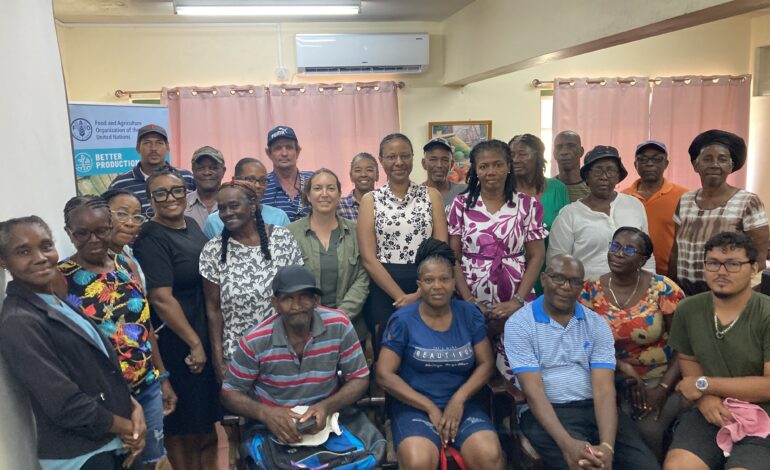
The partnership with the Ministry of Agriculture resulted in the successful training of 47 participants
May 01, 2025 – Kingstown, St. Vincent and the Grenadines – A group of 47 participants including cocoa farmers, processors, extension officers, and other key stakeholders gathered at the Ministry of Agriculture office in downtown Kingstown for the collaborative training workshop between The Food and Agriculture Organization of the United Nations (FAO) and the Ministry of Agriculture, Rural Transformation, Forestry and Fisheries in Saint Vincent and the Grenadines on Cocoa Postharvest Processing and Quality Management. This training formed part of FAO’s Project “Capacity Building Related to Multilateral Environmental Agreements in ACP Countries – Phase III) and aligned with the “Strengthening the Foundations for a Specialty Cocoa Sector in the Caribbean Project”.
Ms Sarah Bharath, Cocoa Postharvest Specialist with FAO facilitated the comprehensive three-day workshop from March 17-19, 2025, equipping participants with practical skills and technical knowledge to improve their postharvest techniques, ensure quality, and unleash the flavor potential of the locally grown and processed cocoa. Best practices for cocoa postharvest processing and crucial control points for fermentation, drying, and storage were meticulously woven into the training to account for the distinctive cocoa environment of Saint Vincent and the Grenadines. This paved the way for lively discussions on a wide range of topics, from cocoa genetics, soil health, sustainable field management approaches and postharvest practices.
While the workshop had many highlights, two which stood out were the field visit to a cocoa farm and a tour of Cocoa Kalinago, a local artisanal chocolate company founded by Andrew and Delphine Hadley, known for its ethically and sustainably sourced cocoa beans. It was during this visit that the participants were able to see firsthand examples of cocoa fermentation unit, drying, roasting and chocolate making equipment and processes.
Along with highlighting the value of cooperation, knowledge sharing, and capacity building, the workshop gave participants a chance to learn from each other and the facilitators while reaffirming their shared dedication to raising the bar for cocoa processing and production in Saint Vincent and the Grenadines. By strengthening technical knowledge and fostering a network of informed stakeholders, the training contributed meaningfully to raising awareness of quality and opened the minds of participants to innovative ways to improve their production and processing.
Mr Benson Stapleton, a cocoa farmer who attended the training stated, “I learned from the training that the scent and the taste of the cocoa beans depend on the way they were grown and processed. I did not realize that the cocoa beans varied based on their environment and way they were prepared.”
Ms Dollis Alexander, owner of Touch of Dawn and cocoa agro-processor highlighted, “The training was timely. The trainer was phenomenal with a wealth of knowledge which she readily shared. The sessions were interactive, and informative and as an agro-processor, my appreciation grew for cocoa processing as a wholesome, income-generating activity. The forum allowed farmers and agro-processors to network for our mutual benefits. I am grateful for the opportunity to attend.”
Anne Desrochers, FAO’s Plant Production and Protection Specialist indicated that the training was successful and well received by the participants. “The aim of this training was to strengthen the capacity of diverse cocoa stakeholders—including farmers, agro-processors, and extension officers—by building awareness of quality at every stage of the value chain: from the soil to the plant and beans in the field, and throughout the postharvest processes such as fermentation, drying, storage, roasting, etc. FAO was pleased to not only share technical knowledge on cocoa postharvest and quality management, but also to facilitate the exchange of experiences among participants and support the development of a strong regional network”.





